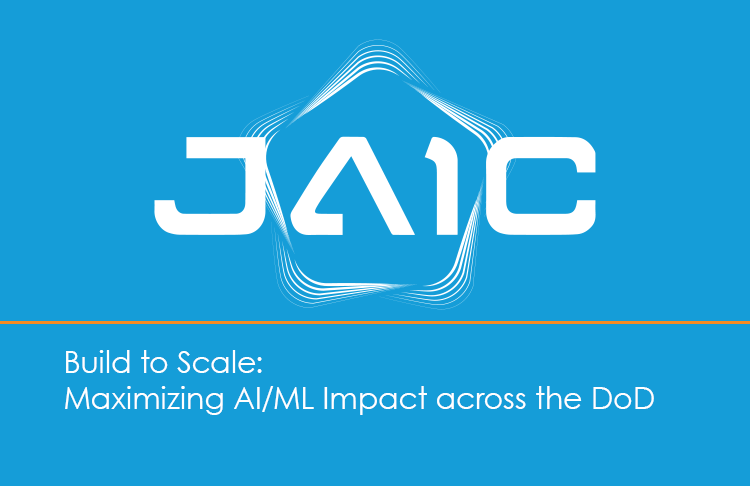Build to Scale:
Maximizing AI/ML Impact across the DoD
- By: JAIC Public Affairs

The Joint Artificial Intelligence Center is making real progress in its efforts to build and deliver Artificial Intelligence capabilities. However, to ensure maximum impact across the Department of Defense, those capabilities will need to be effectively scaled to meet the wide-ranging mission needs of the DoD. This requires taking those AI-enabled tools, concepts, and applications from a small-scale or pilot phase and replicating their capabilities on a much larger scale so they can be used by organizations at the speed of operation.
This is no easy or simple task, but fortunately the JAIC is hard at work on making it happen. The JAIC was established in 2018 to be the focal point of the DoD’s AI strategy to accelerate the scaling of AI capabilities and impact across the Department. In March 2020, the JAIC released its JAIC 2.0 business model. This model is designed to help the JAIC drive DoD transformation through AI by operationalizing lessons learned, creating leverage to drive scale, and catalyzing long-term change through AI.
Packaging for scale is a critical piece of the JAIC 2.0 business model and supports the JAIC’s goal of scaling through infrastructure while supporting and enabling DoD enterprises to pursue their AI use cases. By adopting, scaling, and institutionalizing AI tools and AI-enabled operating concepts, the DoD can deliver more agile and effective AI tools and applications to its warfighters and diverse workforce.
To meet this challenge head on, the JAIC is building the Joint Common Foundation. The JCF will be the premier platform in the DoD for developing and deploying these AI/ML capabilities. It will promote centralized direction for AI/ML efforts while enabling decentralized AI experimentation, development, and testing through strategic data acquisition. To help realize this effort, the JCF will provide reusable tools, frameworks, repeatable patterns, and standards.
By approaching the scaling challenge in this deliberative, coordinated, and ethical way, the DoD will benefit in numerous ways:
- A decrease in the time required to develop new capabilities.
- Higher-quality products.
- The ability to leverage existing work to meet the unique needs of different DoD components.
- An accelerated ability to field applications.
“Scaling is important so that we don’t lose all of the work that’s been done previously,” said U.S. Army Colonel Sang Han, JCF Chief of Infrastructure and Platforms and JAIC Chief Information Officer. “One of the things the JAIC and the JCF can provide is this repository of previously worked applications, source code, and data, kind of a catalog of all the lessons learned in AI/ML.”
Through these repositories, the JAIC can keep track of existing development and then match available code, knowledge, and AI models to the unique needs of a new project. “If someone wants to develop something new or exciting, there’s already a knowledge base and a source code repository that they can look at and take from to build a new application,” Han said. “Having a repository will help cut down on development time and create even better AI/ML products by leveraging the lessons learned. That’s a win for the entire DoD.”
However, Han added, there are obstacles to this type of work. “I think the challenge right now is access. We’re trying to find out where all the data is and where all the previous work has been done,” he explained. “So part of our job is to also encourage developers to bring their projects into the JCF so that we can build a DoD repository.”
Another challenge is getting visibility of who has the AI/ML data and building the connections to the data. “We want to have these interconnections with these other organizations that have the data so that we can share that data to accelerate and scale AI/ML development,” Han said.
Leveraging Industry Knowledge
In addition to the JCF’s efforts, the JAIC is also relying on industry outreach to support its scaling efforts. Working closely with industry, academia, and international partners to leverage external AI technology and knowledge that supports the JAIC’s vision of transforming the DoD through AI.
U.S. Air Force Colonel Doug Drakeley, the JAIC’s Senior Industry Outreach Officer, is leading the effort to meet with and learn from the U.S. commercial AI industry. He’s responsible for building relationships with small, medium, and large businesses and helping the JAIC match its requirements and needs with existing industry capabilities.
His work also involves studying the ways that industry tech giants have scaled their AI technologies and championed innovation. By partnering with industry and examining lessons learned, the JAIC will be able to leverage already existing scaling technologies to build and expedite solutions for the DoD.
“There are tech companies that have mastered how to do AI at scale and we can learn a lot from them. Interestingly, many of them have already followed the same path that we have by setting up something like a joint common foundation for AI within their own companies,” said Drakeley. “The DoD has great labs and great education systems. A lot of innovation is going on there, but the application of that AI and where you see huge investments in AI going on right now is in commercial industries.”
Many leading tech companies, in fact, are investing billions of dollars into AI research and developing huge capabilities for commercial needs, including natural language processing and computer vision, according to Drakeley. “I would say that 90 percent of those capabilities are transferable to what the DoD needs,” he stated.
There are companies that have already mastered how to do AI at scale, Drakeley added, so he and his team are studying their strategies to learn more about the tools, open source software, service providers, and security solutions they’ve used and how they put all the pieces together.